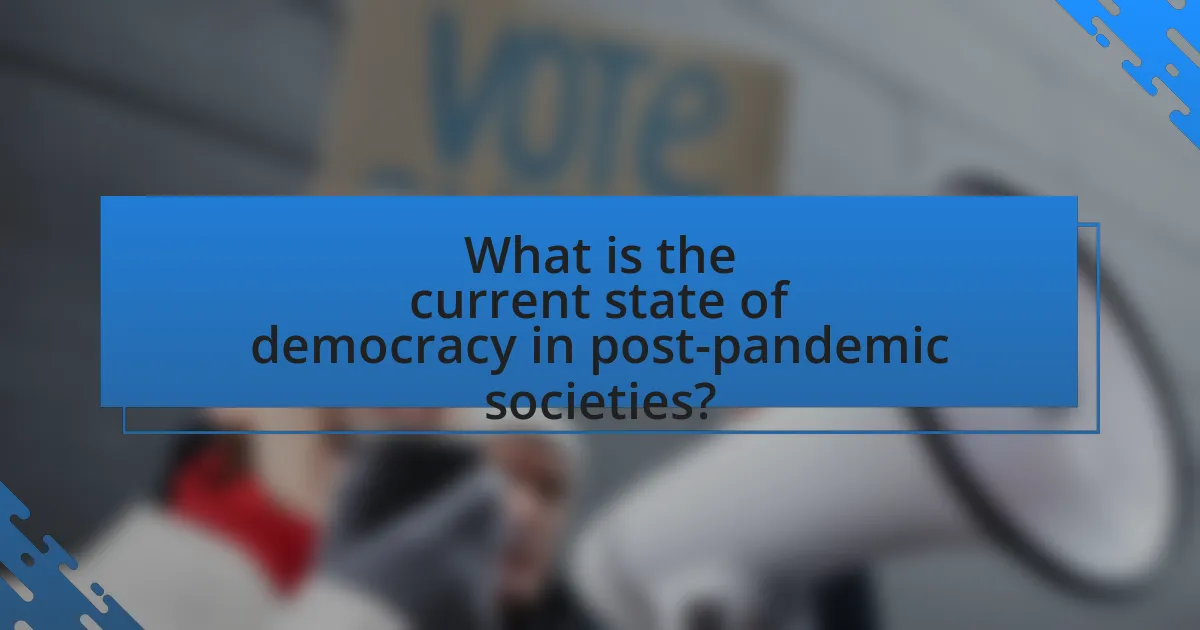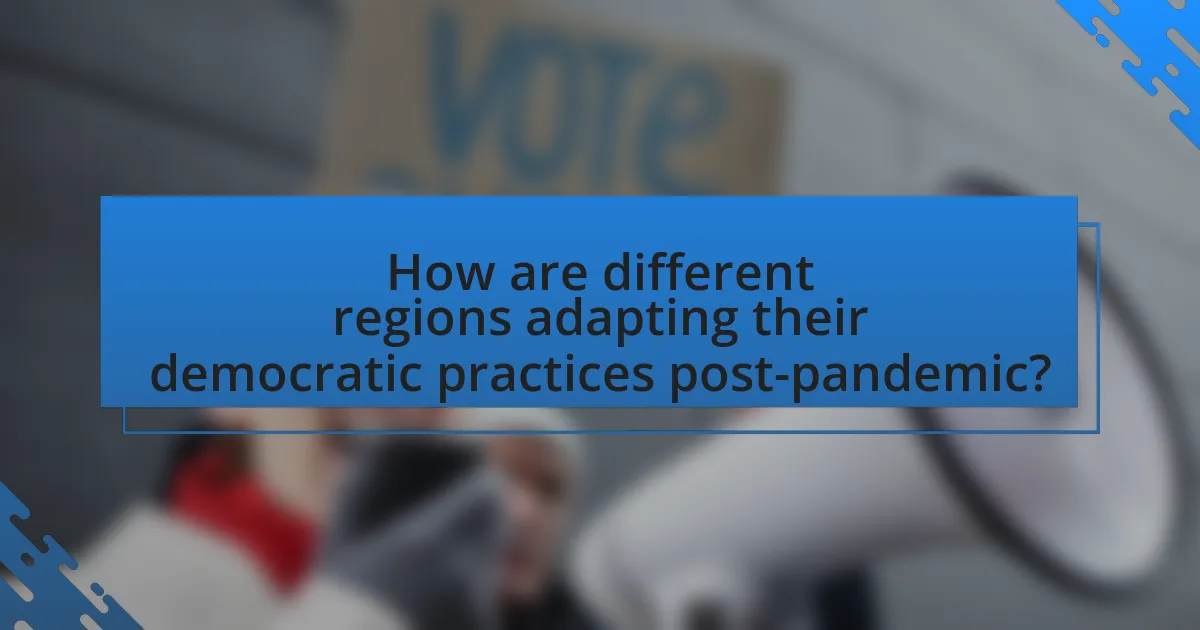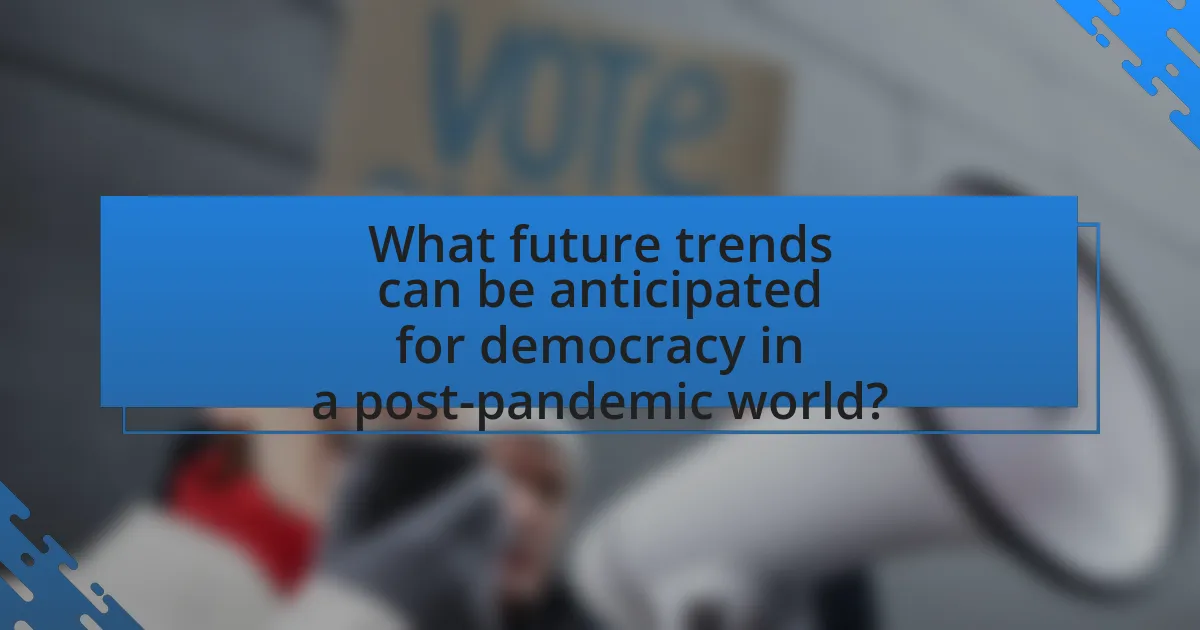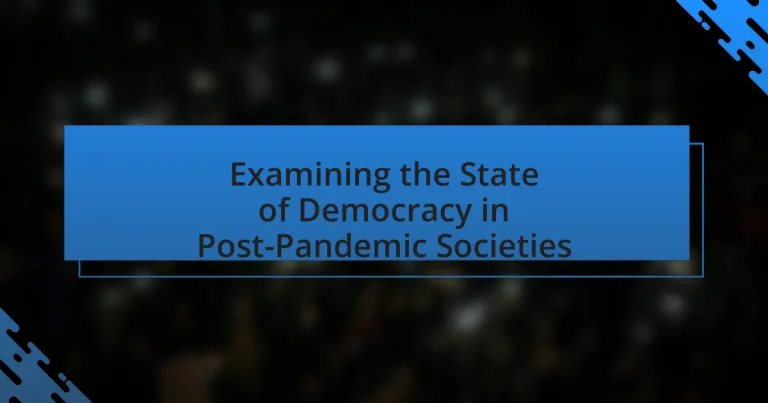The article examines the current state of democracy in post-pandemic societies, highlighting increased polarization, declining public trust in institutions, and the rise of authoritarian tendencies. It discusses the impact of the COVID-19 pandemic on democratic processes, including the suspension of elections and the expansion of executive powers, which have raised concerns about civil liberties. Additionally, the article explores changes in voter behavior, the influence of misinformation, and the challenges democracies face, such as economic recovery and the adaptation of governance models. It also addresses the role of grassroots movements and civic engagement in revitalizing democracy, emphasizing the need for transparency and accountability in governance.

What is the current state of democracy in post-pandemic societies?
The current state of democracy in post-pandemic societies is characterized by increased polarization and challenges to democratic norms. Research indicates that many countries have experienced a decline in public trust in institutions, with a 2021 study by the Pew Research Center showing that 55% of respondents in advanced economies believe their political system is not working well. Additionally, the pandemic has accelerated the rise of authoritarian tendencies, as seen in Hungary and Poland, where governments have used emergency powers to limit civil liberties. These trends highlight the fragility of democratic systems in the aftermath of the pandemic, necessitating vigilance and reform to uphold democratic principles.
How has the COVID-19 pandemic impacted democratic processes?
The COVID-19 pandemic has significantly impacted democratic processes by leading to the suspension of elections, the expansion of executive powers, and increased surveillance measures. For instance, many countries postponed elections to ensure public safety, which disrupted the electoral cycle and delayed democratic representation. Additionally, governments often enacted emergency measures that granted leaders greater authority, sometimes at the expense of legislative oversight, as seen in Hungary, where the government was granted the power to rule by decree. Furthermore, the pandemic accelerated the use of digital surveillance technologies under the guise of public health, raising concerns about privacy and civil liberties. These changes have prompted debates about the balance between public health and democratic governance, highlighting vulnerabilities in democratic systems during crises.
What changes in voter behavior have been observed post-pandemic?
Post-pandemic, there has been a notable increase in voter engagement and participation, particularly among younger demographics. Research indicates that voter turnout in the 2020 U.S. presidential election reached the highest level in over a century, with approximately 66.8% of the eligible population casting ballots, a significant rise from previous elections. Additionally, many voters have shifted towards mail-in and early voting options, driven by health concerns and the desire for convenience. This trend reflects a broader acceptance of alternative voting methods, which were expanded during the pandemic to accommodate social distancing measures.
How have emergency measures affected civil liberties and democratic norms?
Emergency measures have significantly curtailed civil liberties and undermined democratic norms. For instance, during the COVID-19 pandemic, many governments implemented lockdowns, travel restrictions, and surveillance measures that limited freedom of movement and privacy. Reports from organizations like Human Rights Watch and the United Nations highlighted instances where these measures were used to suppress dissent and restrict freedom of expression, illustrating a trend where emergency powers were extended beyond their intended scope. Additionally, the International Institute for Democracy and Electoral Assistance noted that such measures often led to the erosion of checks and balances, weakening the accountability of governments and diminishing public trust in democratic institutions.
What are the key challenges facing democracies in the post-pandemic era?
Key challenges facing democracies in the post-pandemic era include the rise of misinformation, increased polarization, and threats to civil liberties. Misinformation has proliferated through social media, undermining public trust in institutions and complicating informed decision-making. Increased polarization has led to a fragmented political landscape, making consensus and cooperation more difficult. Additionally, governments have implemented emergency measures that sometimes infringe on civil liberties, raising concerns about the long-term implications for democratic governance. These challenges are evident in various countries, where public discourse has become increasingly divisive and trust in democratic processes has waned.
How has misinformation influenced public trust in democratic institutions?
Misinformation has significantly eroded public trust in democratic institutions by creating confusion and skepticism about their legitimacy. Studies indicate that exposure to false information correlates with decreased confidence in electoral processes and government accountability. For instance, a 2020 report by the Pew Research Center found that 64% of Americans believe misinformation undermines trust in government, highlighting the pervasive impact of misleading narratives on public perception. This decline in trust can lead to lower voter turnout and increased polarization, further destabilizing democratic frameworks.
What role does economic recovery play in the stability of democracies?
Economic recovery is crucial for the stability of democracies as it fosters public trust and supports the functioning of democratic institutions. When economies recover, citizens experience improved living standards, which can lead to increased political engagement and support for democratic governance. For instance, the International Monetary Fund reported that countries with robust economic growth tend to have higher levels of political stability and lower incidences of civil unrest. Additionally, economic recovery can reduce the appeal of extremist movements that thrive in times of economic despair, thereby reinforcing democratic norms and values.

How are different regions adapting their democratic practices post-pandemic?
Different regions are adapting their democratic practices post-pandemic by implementing hybrid models that combine in-person and digital participation. For instance, countries like Canada and Germany have enhanced online voting systems and virtual town halls to increase accessibility and engagement among citizens. Additionally, many regions are revising electoral laws to accommodate remote participation, as seen in New Zealand, which allowed for remote voting during the pandemic. These adaptations aim to maintain democratic processes while ensuring public health and safety, reflecting a shift towards more flexible and inclusive governance structures.
What variations exist in democratic resilience across regions?
Democratic resilience varies significantly across regions due to factors such as historical context, political culture, and socio-economic conditions. For instance, in North America and Western Europe, democratic institutions have shown strong resilience, evidenced by stable electoral processes and active civil societies, while in regions like Eastern Europe and parts of Africa, democratic backsliding has occurred, with increased authoritarianism and weakened institutions. According to the 2022 Democracy Index by The Economist Intelligence Unit, Nordic countries rank highest in democratic resilience, while countries like Hungary and Venezuela exhibit severe challenges, highlighting the stark contrasts in democratic health across different regions.
How have European democracies responded to the challenges posed by the pandemic?
European democracies have responded to the challenges posed by the pandemic by implementing a mix of emergency measures, public health policies, and economic support initiatives. For instance, countries like Germany and France enacted lockdowns and social distancing measures to curb virus transmission, while also providing financial aid to businesses and individuals affected by the economic downturn. According to the European Commission, member states allocated over €2 trillion in fiscal measures to support their economies during the crisis. Additionally, many democracies enhanced digital governance and remote participation in political processes to maintain civic engagement despite restrictions. These actions reflect a commitment to balancing public health needs with democratic principles.
What lessons can be learned from emerging democracies in the post-pandemic context?
Emerging democracies in the post-pandemic context highlight the importance of resilience, adaptability, and civic engagement. These democracies have demonstrated that effective governance requires transparency and accountability, especially during crises. For instance, countries like Taiwan and South Korea effectively utilized technology for contact tracing and public communication, which not only helped manage the pandemic but also strengthened public trust in government institutions. Furthermore, the pandemic underscored the necessity for inclusive policies that address social inequalities, as seen in various nations that prioritized marginalized communities in their recovery plans. These lessons emphasize that robust democratic practices are essential for navigating future challenges and fostering societal cohesion.
What innovations in governance have emerged as a result of the pandemic?
Innovations in governance that have emerged as a result of the pandemic include the accelerated adoption of digital technologies for public service delivery and enhanced citizen engagement. Governments worldwide implemented online platforms for remote work, virtual meetings, and digital consultations, which improved accessibility and efficiency in decision-making processes. For instance, according to a report by the United Nations, 70% of countries increased their use of digital tools to engage with citizens during the pandemic, demonstrating a significant shift towards e-governance. Additionally, the pandemic prompted the establishment of data-driven policies, as governments utilized real-time data analytics to inform public health responses and resource allocation, thereby increasing transparency and accountability in governance.
How has technology reshaped political engagement and participation?
Technology has significantly reshaped political engagement and participation by facilitating instant communication and access to information. Social media platforms, such as Twitter and Facebook, have enabled citizens to mobilize quickly, share opinions, and organize protests, as seen during movements like the Arab Spring in 2011, where social media played a crucial role in coordinating demonstrations. Additionally, online tools and platforms have increased voter engagement through initiatives like online voter registration and digital campaigning, which have been shown to enhance participation rates, particularly among younger demographics. According to a 2020 Pew Research study, 53% of Americans reported that social media helped them become more informed about political issues, illustrating the impact of technology on political awareness and involvement.
What new models of governance are being explored in response to the pandemic?
New models of governance being explored in response to the pandemic include decentralized decision-making, digital governance, and participatory budgeting. Decentralized decision-making allows local authorities to respond more swiftly to community needs, as seen in various countries where local governments were empowered to manage health responses. Digital governance has gained traction, with governments utilizing technology to enhance transparency and citizen engagement, exemplified by the use of apps for contact tracing and information dissemination. Participatory budgeting has also emerged, enabling citizens to have a direct say in budget allocations, fostering greater accountability and responsiveness in governance. These models reflect a shift towards more inclusive and adaptive governance structures in the wake of the pandemic.

What future trends can be anticipated for democracy in a post-pandemic world?
Future trends anticipated for democracy in a post-pandemic world include increased digital participation, heightened scrutiny of government actions, and a potential rise in populism. The pandemic accelerated the adoption of technology in governance, leading to more online voting and civic engagement platforms, which can enhance democratic participation. Additionally, the global health crisis has prompted citizens to demand greater accountability and transparency from their governments, as seen in various protests and movements advocating for democratic rights during and after the pandemic. Furthermore, economic instability and social unrest may fuel populist movements, as evidenced by historical patterns where crises lead to shifts in political landscapes. These trends suggest a transformative period for democracy, influenced by technological advancements and societal demands for change.
How might global cooperation evolve in the context of democratic governance?
Global cooperation may evolve through enhanced multilateral frameworks that prioritize democratic values and human rights. As nations increasingly recognize the interconnectedness of global challenges, such as climate change and public health, democratic governance can facilitate collaborative efforts by promoting transparency, accountability, and citizen engagement. For instance, the Paris Agreement exemplifies how democratic nations can unite to address climate issues, demonstrating that shared governance principles can lead to effective international partnerships. Furthermore, organizations like the United Nations are adapting to include more democratic processes, which can strengthen global cooperation by ensuring that diverse voices are represented in decision-making.
What implications do rising authoritarianism trends have for global democracy?
Rising authoritarianism trends significantly undermine global democracy by eroding civil liberties and diminishing political pluralism. Authoritarian regimes often restrict freedom of speech, assembly, and the press, which are essential components of democratic societies. For instance, the decline in democratic governance has been documented in various countries, with the Freedom House 2023 report indicating that global freedom has declined for 17 consecutive years, highlighting the increasing prevalence of authoritarian practices. This trend not only stifles dissent but also creates an environment where electoral integrity is compromised, leading to manipulated elections and weakened institutions. Consequently, the rise of authoritarianism poses a direct threat to the foundational principles of democracy, including accountability, transparency, and citizen participation.
How can democracies strengthen their institutions to withstand future crises?
Democracies can strengthen their institutions to withstand future crises by enhancing transparency, accountability, and civic engagement. Strengthening transparency ensures that government actions are open to public scrutiny, which builds trust and reduces corruption. For instance, countries like New Zealand have implemented robust transparency measures that have improved public confidence in government during crises.
Increasing accountability through independent judicial systems and oversight bodies allows for checks on power, preventing abuses that can arise during emergencies. The establishment of independent commissions, as seen in Canada, has proven effective in holding officials accountable for their decisions during crises.
Promoting civic engagement empowers citizens to participate actively in governance, fostering resilience. Research indicates that higher levels of civic participation correlate with stronger democratic institutions, as seen in the participatory budgeting initiatives in Brazil, which have led to more responsive governance.
These strategies collectively enhance the robustness of democratic institutions, enabling them to better navigate and recover from future challenges.
What practical steps can citizens take to support democracy in their societies?
Citizens can support democracy in their societies by actively participating in the electoral process, which includes voting in local, state, and national elections. Engaging in elections is crucial as it directly influences governance and policy-making. According to the U.S. Census Bureau, voter turnout in the 2020 presidential election was approximately 66.8%, the highest rate since 1900, indicating that increased participation can significantly impact democratic outcomes. Additionally, citizens can advocate for transparency and accountability in government by attending town hall meetings, contacting elected officials, and supporting organizations that promote civic engagement. Research from the Pew Research Center shows that civic engagement fosters a more informed electorate, which is essential for a healthy democracy. By educating themselves and others about political issues and encouraging discussions, citizens can create a more informed public that holds leaders accountable.
How can individuals engage in civic education and advocacy effectively?
Individuals can engage in civic education and advocacy effectively by participating in community organizations, attending workshops, and utilizing online resources to enhance their understanding of democratic processes. Engaging with local civic groups allows individuals to collaborate on initiatives that promote civic knowledge and advocacy efforts. For example, organizations like the League of Women Voters provide resources and training on voter registration and civic engagement, which can empower individuals to take action. Additionally, online platforms such as Coursera and edX offer courses on civic education, enabling individuals to learn at their own pace and apply that knowledge in advocacy efforts. These methods not only increase awareness but also foster a sense of responsibility towards civic participation, which is crucial in strengthening democracy in post-pandemic societies.
What role do grassroots movements play in revitalizing democracy post-pandemic?
Grassroots movements play a crucial role in revitalizing democracy post-pandemic by fostering civic engagement and mobilizing communities around shared goals. These movements empower individuals to participate actively in the democratic process, often addressing issues that mainstream political entities overlook. For instance, during the COVID-19 pandemic, grassroots organizations have been instrumental in advocating for social justice, equitable healthcare access, and economic relief, which are essential for rebuilding trust in democratic institutions. Research indicates that grassroots activism can lead to increased voter turnout and greater political participation, as seen in the 2020 U.S. elections where organizations like Black Lives Matter and various local coalitions significantly influenced voter engagement.





